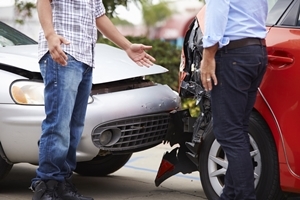Virginia has harsh driver negligence laws for those at fault for a car accident. If you are named as the at-fault party, even if you are only partially responsible, it is unlikely you will be able to receive damages for a car crash. If a police report states that you are partially at fault, the other driver’s insurance company can use the judgment against you, making it more difficult for you to recover any damages.
How Is Fault for a Car Crash Determined by Virginia Law?

Fault can be determined by a combination of three factors:
- The police can establish the most-at-fault party in the initial police report following an accident.
- The other driver’s insurance adjuster will negotiate with you to establish relative degrees of fault.
- You can be cited as a contributor to the accident if you admit fault at any time following an accident. In order to avoid losing potential damages, it is best to never admit fault, even if you believe that you are partially responsible for the incident.
What Can Damages Cover?
Damages can cover most accident-related medical bills and property damages. In addition, victims of driver negligence may recover damages for:
- Missed work and lost wages
- Pain and suffering
- Emotional distress
- Wrongful death(s)
- Loss of companionship
How Can I Help My Case?
Even if a police report states that you’re at fault for the accident, there are still ways to protect your case. In order to help your attorney defend your innocence as effectively as possible, you can:
- Take photos of the accident. Anything that can be used as evidence such as damaged property, injuries, and license plate numbers can help strengthen your personal injury claim. You should try to photograph:
- Injuries—such as burns, cuts, and bruises
- Flat tires and dented or disfigured vehicle parts
- The spot where the accident occurred
- Gather relevant information. Record the time of the incident, contact information for any potential eye witnesses, and anything you remember about the accident. Most people remember best immediately following an accident, before they speak with the other driver or first responders. If you are physically able to do so, jot down any key details such as the speed you were traveling, when you first saw the other driver, whether the other driver was violating any traffic laws, where you feel pain or discomfort, and anything else that may be helpful for your personal injury defense. Keep these notes in a safe place, and remember not to admit fault to anyone.
- Do not interact with the other driver’s insurance company. Anything you say in a recorded statement can be used against you when establishing who was at fault. The other driver’s insurance adjuster is going to use any piece of information to prove that you were at least partially at fault—even if only one percent. Contact your personal injury attorney prior to giving any statements to an insurance provider regarding the incident.
- Avoid giving feedback on your condition. Following an accident, it is common for bystanders and even the other driver to innocently ask whether you’re OK. While you may want to respond that you are “good” or “fine,” this response may ultimately be used against you later. It is best to avoid supplying a definitive answer and, instead, to reply “I’m not sure” or “I’ll see what the doctor says.”
What Happens If I’m at Least One Percent at Fault?
There may still be a chance that you can recover damages for a car accident, even if you’re found to be partially at fault. This can be decided under the “last clear chance” doctrine, which is used to determine which party had the last opportunity to avoid the accident. If the other driver had the last chance to avoid the accident but failed to do so, for whatever reason, you may still be able to recover damages. Contact the law firm of Kearney, Freeman, Fogarty, and Joshi to discuss your case, even if you were found partially responsible.
|
Related links: |

